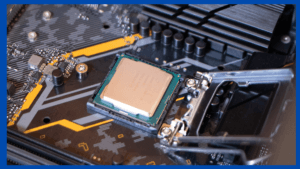When China stops the production of CPUs, the global market will be affected. Many companies that manufacture CPUs rely on China for a large portion of their production.
If China suddenly ceases production, these companies will have to find a new supplier or face significant financial losses.
In addition, the global market for CPUs is highly competitive, and any company that cannot compete will likely go out of business.
In this article, you get all the information related to What Happens When China Stop CPU Production.
Does China Make CPU?
It is no secret that China has become a powerhouse in the manufacturing industry. From clothes to cars, just about everything can be made in China.
So the question arises: does China make CPUs? The answer is yes and no. While China does not currently produce CPUs, it is home to many of the world’s leading semiconductor companies.
These companies supply the processors used in computers and other electronic devices. So while China may not produce CPUs, it certainly plays a significant role in their production.
It makes it a key player in the global technology market and ensures that Chinese-made products are some of the most sought-after worldwide.
What Happens When China Stops CPU Production?
- Impact on the global economy
- Impact on businesses
- Impact on consumers
-
Impact on the global economy
The global economy could be impacted when China stops CPU production. The main reason is that China is a crucial player in the global supply chain.
If they stop producing CPUs, it will have a ripple effect on other industries. For example, if China stops producing CPUs, the United States might import them from other countries.
It could lead to an increase in prices for consumers and a decrease in profits for businesses.
-
Impact on businesses
The global market for microprocessors is about to experience a significant upheaval. That’s because one of the world’s largest CPU manufacturers, China-based semiconductor company, Loongson Technology, has announced that it will cease production of microprocessors by the end of 2019.

This move is expected to have a significant impact on businesses around the globe. Companies relying on Loongson CPUs for their operations must find alternative suppliers.
It could be not easy, as Loongson is one of the only companies manufacturing CPUs using a 64-bit MIPS architecture.
Additionally, the move could increase microprocessors’ prices as suppliers attempt to recoup lost revenue. It could have a ripple effect throughout the technology industry, causing prices for devices like laptops and smartphones to increase.
-
Impact on consumers
The halt in the production of CPUs by a Chinese company is expected to impact consumers significantly. The world’s largest manufacturer of computer processors, China-based company AMD, has announced that it will stop producing its central processing units (CPUs) due to the outbreak of the novel coronavirus.
It will leave a massive vacuum in the market for CPUs, as AMD currently accounts for around a third of the global CPU market share.
AMD’s announcement has sent shockwaves throughout the global technology sector, as other major manufacturers are also expected to be affected.
Intel, the world’s largest producer of semiconductors, has already warned investors that its revenue for the current quarter could be down by as much as 10%.
Samsung Electronics and TSMC, two of the world’s largest chipmakers, have also said that they expect their profits to decline this year.
What does it mean for the global market When China stops CPU Production?
In early July, the Chinese government announced that it would stop all CPU production by the end of the year.
This news has sent shockwaves through the global market, as China is the world’s largest producer of CPUs.
While the Chinese government has not given a reason for this decision, many analysts believe it is a response to the US-China trade war.
This decision is likely to have a significant impact on the global market. Not only will it lead to higher prices for CPUs, but it could also lead to a shortage of CPUs worldwide. It could harm businesses and consumers alike.
The Chinese government’s decision to stop CPU production could also have political implications. It may be seen as a way of retaliating against the United States for its trade policies.
What are the alternatives for CPU production?
The alternatives for CPU production are a central processing unit, field-programmable gate array, and graphical processing unit.
A central processing unit is a microprocessor that controls the entire computer. A field-programmable gate array is an integrated circuit programmed to perform specific functions.
A graphical processing unit accelerates the performance of images and videos.
What are the possible implications of this announcement When China stops CPU Production?
The world’s largest manufacturer of CPUs, Intel, recently announced that they would be ceasing production of their 14nm CPUs in favour of a new 10nm process.
This move could potentially significantly impact the global market, leaving AMD as the only major player in the CPU market.
There are a few potential implications of this announcement.
- One possibility is that AMD will become the dominant player in the CPU market, as Intel’s 10nm CPUs won’t be available until 2020. It could lead to increased competition between the two companies and lower consumer prices.
- Another possibility is that AMD will struggle to keep up with demand once Intel ceases production of their 14nm CPUs. If this happens, it could lead to shortages and higher consumer prices. We’ll keep you updated as details emerge.
Final Thoughts
In conclusion, it is evident that if China were to stop CPU production, the global market would be affected in several ways.
The most significant impact would be on the United States, whose economy largely depends on Chinese manufacturing. In the short term, there would likely be a spike in prices as other countries attempt to fill the void left by China.
However, it is uncertain how the market would adjust in the long term. The global market is in for a turbulent time as countries scramble to find new sources for CPUs.
Related Article:
Is There a CPU Proof Of Work Algorithm in Blockchain? (Explained)

